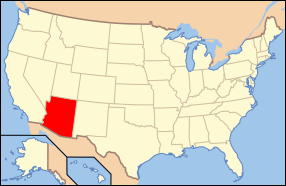 Image via Wikipedia
Image via WikipediaOctober 27, 2010 4:10 PM
Human trafficking may seem like a remote threat in Arizona, but one official says it happens more often than one thinks.
Dennis Burke, U.S. attorney for the District of Arizona, said human traffickers are luring young women into prostitution. The traffickers are also bringing people into the country as forced labor, which he described as modern-day slavery.
He explained that human trafficking is different from human smuggling, which is when people pay a “coyote” to smuggle them across the border. They come into the country illegally but willingly.
As for human trafficking, “people think in this day and age, it can't happen, but it happens a lot more than anybody can imagine,” Burke said.
Patrick Cunningham, criminal division chief in the District of Arizona, said the U.S. Department of Labor has also learned of cases where agriculture workers were being forced to work.
But just as often, human trafficking comes in the form of forced prostitution.
“Most often young women are forced into prostitution or forced labor. They're brought into this country for this sole purpose, not just from Mexico, but Asia and Europe.”
Burke said he knows of cases where motels were fully staffed with forced labor.
“They were brought here to work, and it wasn't consensual,” he said.
The fact that victims are very reluctant to talk to law enforcement makes it difficult to discover all cases of human trafficking.
“It's fear. Sometimes the only person the victim knows in this country is the person that brought them here. Some victims don't even know where they are in the country,” Burke said.
In other cases, prostitution rings recruit young women already in the country. Cunningham said this type of recruitment often occurs in malls.
“(The recruiter might be) a young man driving an Escalade. He tells a young woman, ‘Hey, want to go out to dinner, a concert?' But he's really recruiting,” Cunningham said.
He said some law enforcement officials have been surprised to find people who they thought were prostitutes but were really victims of forced prostitution.
“(Officials) thought it was only a local case of prostitution and didn't realize it was part of a larger ring,” Cunningham said.
Accordingly, the U.S. Department of Justice is training law enforcement officers to know what to do in such cases.
These cases are usually investigated by the Department of Justice's Civil Rights Division, which looks into allegations of “use of force or threats of force or other forms of coercion to compel labor or services, including commercial sex acts, from victims. Modern-day slavery can involve migrant farm laborers, sweat shop workers, domestic servants and brothel workers. Victims may be U.S. citizens or aliens or adults or children,” according to the department's website (www.justice.gov).
In addition, Burke said, last year, the department created a Civil Rights Division unit whose day-to-day responsibility is to investigate hate crimes and allegations of excessive force by law enforcement, not just police officers but also Border Patrol and other officials.
Hate crimes are defined as “violent and intimidating acts motivated by animus (ill will) based on race, ethnicity, national origin, religious beliefs, gender, sexual orientation or disability.
Official misconduct is defined as “intentional acts by law enforcement officials who misuse their positions to unlawfully deprive individuals of constitutional rights, such as the right to be free from unwarranted assaults, illegal arrests and searches and theft of property.
Law enforcement officers are also receiving training on “what they are allowed to do,” Burke said.
The department is also trying to educate the public, letting them know what their civil rights are.
“It's a lot of work in the sense that we go out and tell people they have the right to come to us,” Burke said.
“It's that fear again, fear that they will beat me up. They don't know what their rights are. It could be a cultural thing, maybe they're undocumented, or come from countries where they're not comfortable with law enforcement,” Burke said.
Mara Knaub can be reached at mknaub@yumasun.com or 539-6856.
Burke: Forced prostitution, labor still a problem, burke, forced, enforcement - News - YumaSun
Source: YumaSun.com


No comments:
Post a Comment